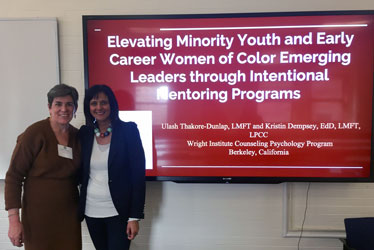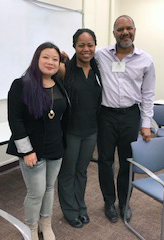
Wright Institute Faculty Visit New York for Columbia Winter Roundtable
 Each February, the Columbia University Teachers' College annual Winter Roundtable calls together psychologists, therapists, professors, and social workers to discuss cultural issues ranging from immigration and racial justice to community-based trauma. Now in its 36th year, the Winter Roundtable is "the longest running continuing professional education program in the United States devoted solely to cultural issues in psychology, education, and social work."
Each February, the Columbia University Teachers' College annual Winter Roundtable calls together psychologists, therapists, professors, and social workers to discuss cultural issues ranging from immigration and racial justice to community-based trauma. Now in its 36th year, the Winter Roundtable is "the longest running continuing professional education program in the United States devoted solely to cultural issues in psychology, education, and social work."
Six Wright Institute faculty members presented at this year's Winter Roundtable, held at Columbia University in New York City on February 22 and 23. The theme of this year's gathering was "Rise Up," tackling issues in racial justice, immigration, social activism, education, unity, and psychology.
Wright Institute Counseling Psychology Program full-time faculty members Kristin Dempsey, EdD, LMFT, LPCC and Ulash Thakore-Dunlap, LMFT jointly presented Elevating Minority Youth and Early Career Women of Color Emerging Leaders Through Intentional Mentoring Programs, which highlights the mentoring work that both Thakore-Dunlap and Dempsey are embarking on in their professional circles.
 Also presenting at the Winter Roundtable were full-time faculty member Stephanie Chen, PhD, core faculty member Taquelia Washington, LCSW, and Lyman Hollins, who is an adjunct faculty member with both the Wright Institute Counseling Psychology and Clinical Psychology programs. The three instructors served on a panel to discuss Multicultural Awareness and Sensitivity, a Counseling Psychology Program course that all three have had a hand in instructing.
Also presenting at the Winter Roundtable were full-time faculty member Stephanie Chen, PhD, core faculty member Taquelia Washington, LCSW, and Lyman Hollins, who is an adjunct faculty member with both the Wright Institute Counseling Psychology and Clinical Psychology programs. The three instructors served on a panel to discuss Multicultural Awareness and Sensitivity, a Counseling Psychology Program course that all three have had a hand in instructing.
Matthew Mock, PhD, in his first year as a Wright Institute adjunct instructor, delivered two presentations at the Winter Roundtable - one highlighting Asian and Asian American individuals and communities, and one highlighting gender inequities in our society.
Full-time faculty member Mary Clarke, PhD is also a veteran of the Winter Roundtable. "It's so exciting to be at a conference where each keynote speaker is an agent of social change," Clarke says. "The Roundtable is filled with research and discussions that put diversity, intersectionality, and social and racial justice on the forefront." While she did not attend the 2019 conference, Clarke plans to attend next year. "I left last year's conference feeling renewed, and excited to support our future clinicians by sharing and teaching the ideas that were spread at the Roundtable," she says. "I will definitely be back in the future."
Dempsey echoes her sentiments. "It's helpful and inspiring to have conversations with so many colleagues interested in promoting diversity in psychology and teaching issues of social justice," she says.
Dempsey and Thakore-Dunlap's presentation focused on providing intentional mentoring for two groups of professionals at different career stages. Dempsey's portion of the presentation focused on minority high-school aged youth entering careers in behavioral health, whereas Thakore-Dunlap's portion of the presentation focused on women of color who are emerging leaders in the fields of counseling and psychology.
"We want to develop enjoyable mentoring activities," says Dempsey of her mission to engage high school students in mentoring. One of these is "speed" mentoring, which is a method that allows high school students to explore career paths in behavioral health with several professionals in an informal way. "It really is like speed dating," Dempsey says. In this setting, mentors move from table to table and introduce themselves to many different students. "This lets students meet counselors, psychiatrists, and other behavioral health professionals in a low-pressure environment."
Other approaches are more straightforward, as Dempsey also engages in conversations about mentorship with students that aim to give students the tools to help themselves. "We want students to get internships in behavioral health," says Dempsey, "but we also want them to have beneficial mentoring experiences that go beyond the length of an internship."
Another aspect of Dempsey's presentation centered on assisting students with identifying the mentors that they already have in their lives, as well as the essential skills for engaging with potential mentors. "The goal is to engage diverse high school students in mentoring opportunities that are meaningful and inspiring," says Dempsey. "Many students don't necessarily know how to go about obtaining and developing a mentoring relationship."
Dempsey also wants the young professionals with whom she works to be able to pass along the lessons they learn about mentoring. "We want students to get mentors for themselves, but also be mentors for others," she says. "The back-and-forth between those two processes can be truly valuable." This relationship between mentoring for others while also finding a mentor for yourself was a significant focus of Dempsey's presentation at the Winter Roundtable.
While Dempsey's intentional mentoring program is focused on high school students, Thakore-Dunlap's is focused on emerging leaders in the fields of counseling and psychology. Alongside her own mentor, Heather Ehinger, EdD, LMFT, Thakore-Dunlap leads a Master Mind group for four women of color who are self-motivated and committed to developing their leadership aspirations.
"These women have had similar professional experiences. They have not had much access to positive mentors, and have been told their entire careers that they aren't good enough," Thakore-Dunlap says. However, the women in the group have used these shared experiences to help each other. "They are so supportive of each other, which is fantastic. There's a sort of comfort in realizing that your peers are going through the same struggles that you are."
Over the course of four months, the Master Mind group will help its members focus on one specific leadership goal, and will guide them in developing a plan to tackle it once the group is no longer meeting. "I want the participants to focus on what leadership means to them, as well as how their identities play a role in their leadership journeys," says Thakore-Dunlap. "I'm getting them to answer this: 'As a woman of color, what has gotten in the way of your leadership goals?'"
The Master Mind group is facilitated by Thakore-Dunlap and Dr. Ehinger, but is largely run by the four women of color who are developing as leaders. Each session begins with each one of the four women talking for 20 minutes, with no interruptions from the other group members. "We've found that these women have never had the opportunity to take up so much space before," says Thakore-Dunlap. "We're looking to make them comfortable with taking up that space."
"The possibility of providing flexible mentoring programming is not always apparent in discussions of mentoring," Thakore-Dunlap says. Groups like the Master Mind group for emerging women of color leaders are flexible in both their concept and execution. The program has a specific population in mind, but draws from women all across the United States. While the basic format will remain the same between sessions, Thakore-Dunlap and Dr. Ehinger will adjust their roles in the group as they continue. "As the women's leadership goals get clearer and sharper, Dr. Ehinger and I will take on a more directive role," Thakore-Dunlap says. "Rather than observing passively, we will be coaching, action planning, and serving as active resources."
"The level of detail in Ulash's work is remarkable," noted Dempsey. Thakore-Dunlap was equally impressed by Dempsey's work at the Winter Roundtable. "Kristin was so inspiring! Her work with high school students really is exceptional," said Thakore-Dunlap.
"Mentoring can take many forms along the lifespan," says Dempsey. With two mentoring programs tailored for two distinct populations, Kristin Dempsey and Ulash Thakore-Dunlap are ensuring that emerging generations of leaders in counseling and psychology will be well prepared for the challenges that lie ahead of them.
Learn more about the Wright Institute's Master of Counseling Psychology program.
Learn more about the Wright Institute's Doctor of Clinical Psychology (Psy.D.) program.
